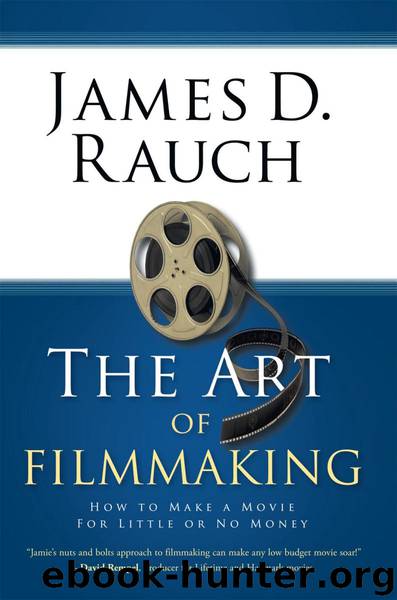The Art of Filmmaking by James D. Rauch

Author:James D. Rauch [Rauch, James D.]
Format: epub
Publisher: Trafford Publishing Inc.
Published: 2010-03-04T16:00:00+00:00
5
Do “Your” Job!
__________________________
Now that you’re at the stage of shooting your movie, you can focus on what your job is on set. Before the first day on set you have already chosen a role for yourself. That being said, you’re either the director, producer, executive producer, and or the PM. You can be all of these roles if you want to but the point of this chapter is to define a specific role for you to focus on.
When I’m the director, I’ve always been a producer as well. In pre-production I’m 98% producer and 2% director. It’s behind the closed doors where I’m the director (also when I‘m doing the casting there‘s a lot of director that comes out), meaning it‘s usually when I‘m at home I do the director thinking.
It’s the utmost of importance that you focus on one aspect of your film while your shooting. If you chase too many rabbits at the same time, you’ll lose all of them (a little different than the old saying, but you get the point).
For example, on my first film I was writer/director/producer. In the middle of shots I was thinking about producer concerns, which almost wrecked the film. Only because I should have been directing and not so worried about everything going on around me.
Thus, I’ll teach you here in this chapter what you should be focusing on while your shooting your film. If you’re the director or not, there are so many elements that you can participate in.
The Director
I’ll start with the director and what the job means on a no budget film. The reason why I’m starting with the director is because most of the time this is what you’ll be doing. Again, you’ll also be one of the producers, because this is your movie.
So you have to establish right from the get go with the other producers that you have the final say. But you’ll never be stubborn to the point where none of you agree on something. If 3 out of 4 producers want to see something happen, it’s probably because it should happen. The only time where if that happens and you’re the one producer who doesn’t agree, is when it involves you artistically, with the final product of the movie. Just remember, listen to what they say, and don’t speak too quickly…be slow to speak. This will help you on your process to success as a filmmaker.
You’re the director. I won’t be telling you how to direct in a technical sense (like what the shoots are called, the axis, your lines, etc), because that’s another books worth of reading. What I will teach you here is how to focus on what’s important about your job that people don‘t teach, so that you won’t get stuck in the middle of your shoot wondering what went wrong. Here you’ll be 98% director and 2% producer (remember, it‘s your movie thus, your a producer too).
Always and every time you step onto set ready to go. The first thing you do is, communicate with your DOP, 1st AD, gaffer, and key grip.
Download
This site does not store any files on its server. We only index and link to content provided by other sites. Please contact the content providers to delete copyright contents if any and email us, we'll remove relevant links or contents immediately.
The Kite Runner by Khaled Hosseini(5183)
Gerald's Game by Stephen King(4655)
Dialogue by Robert McKee(4406)
The Perils of Being Moderately Famous by Soha Ali Khan(4221)
The 101 Dalmatians by Dodie Smith(3512)
Story: Substance, Structure, Style and the Principles of Screenwriting by Robert McKee(3470)
The Pixar Touch by David A. Price(3442)
Confessions of a Video Vixen by Karrine Steffans(3311)
How Music Works by David Byrne(3272)
Harry Potter 4 - Harry Potter and The Goblet of Fire by J.K.Rowling(3074)
Fantastic Beasts: The Crimes of Grindelwald by J. K. Rowling(3059)
Slugfest by Reed Tucker(3007)
The Mental Game of Writing: How to Overcome Obstacles, Stay Creative and Productive, and Free Your Mind for Success by James Scott Bell(2909)
4 - Harry Potter and the Goblet of Fire by J.K. Rowling(2704)
Screenplay: The Foundations of Screenwriting by Syd Field(2645)
The Complete H. P. Lovecraft Reader by H.P. Lovecraft(2565)
Scandals of Classic Hollywood: Sex, Deviance, and Drama from the Golden Age of American Cinema by Anne Helen Petersen(2526)
Wildflower by Drew Barrymore(2489)
Robin by Dave Itzkoff(2441)
